Portret de Voluntar – Vitor (Portugalia)
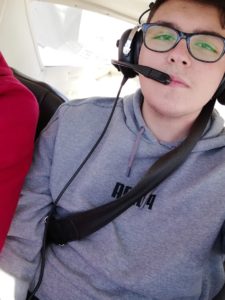 Hello everyone, my name is Vítor or Simão as most people call me. I am 19 years old and I came from a town called Ermesinde in Porto.
Hello everyone, my name is Vítor or Simão as most people call me. I am 19 years old and I came from a town called Ermesinde in Porto.
I finished high school and before I moved on with my studies I wanted to gain some work experience so I went to work but I wasn’t happy with that and felt really frustrated with my work and myself so a few months later a friend of mine which did EVS in Bulgaria told me about it and I wanted to experience it.
I saw this Romanian project in Curba da Cultura and immediately I knew that I wanted to go to Romania, I love nature I love camping, hike and many other activities regarding nature mainly GeoCaching. So I came, I’m in Romania for three days and I’m absolutely loving it, for a Portuguese guy the snow is a new for me I only have seen it once when I was 8 so it was a long time ago. I’m currently living in Homorâciu a very rural village where life is simple and it’s really different for me because I’m a city boy but I just created two different hobby that are crack wood and start fire.
I love travel, meet cultures and learn new languages so I hope that at the end of my EVS I will be able to speak a little bit of Romanian because it sounds really interesting. I will try to learn everything I can from the Romanian culture and bring that to my country as well as leave a little bit of Portugal in Romania.
The plan after my EVS is to start my airline transport pilot licence(ATPL) which basically means that I want to become ani airline pilot. I have to thank everyone in Curba for being so kind to me and the rest of the volunteers as well.
Bună tuturor, numele meu este Vítor, sau Simão cum îmi spun majoritatea persoanelor. Am 19 ani și am venit dintr-un oraș numit Ermesinde din Porto.
Am terminat liceul și înainte de a merge mai departe cu studiile mele am vrut să câștig niște experiență de muncă, așa că am mers să lucrez dar nu am fost fericit cu asta și m-am simțit foarte frustrat cu munca mea și cu mine pentru câteva luni. Mai târziu, un prieten al meu care a făcut SEV în Bulgaria mi-a spus despre asta și am vrut să experimentez și eu.
Am văzut proiectul acesta românesc în Curba de Cultură și am știut imediat că am vrut să merg în România. Iubesc natura, iubesc excursiile cu cortul, drumețiile și multe alte activități legate de natură, în special GeoCaching-ul. Așa că am venit, sunt în România de trei zile și o absolut iubesc. Penteu un tip portughez zăpada este nouă pentru mine, am văzut-o doar o dată când aveam 8 ani deci a fost cu mult timp în urmă. Momentan locuiesc în Homorâciu, un sat foarte rural unde viața e simplă și e foarte diferit pentru mine penteu că sunt un băiat de oraș dar tocmai am creat două hobby-uri noi care sunt tăiatul de lemne și făcutul focului.
Iubesc călătoritul, să cunosc culturi și să învăț limbi noi așa că sper că la sfârșitul SEV-ului meu voi putea să vorbesc puțină română deoarece sună foarte interesant. Voi încerca să învăț tot ceea ce pot de la cultura românească și să aduc asta în țăra mea, precum și să las un pic de Portugalia în România.
Planul de după proiectul meu SEV este să îmi încep licența de pilot de transport aerian (ATPL) ceea ce practic înseamnă că vreau să devin pilot aerian. Am de mulțumit tuturor celor din Curba pentru că au fost așa de buni cu mine și celorlalți voluntari de asemenea.
Vitor este în România pentru o perioadă de opt luni, din ianuarie 2019 până în septembrie 2019, în cadrul proiectului Building Youth Supportive Communities – Environment [2017-2-RO01-KA105-037748] proiect co-finanțat de Uniunea Europeană prin Programul Erasmus+ și implementat în România de către Curba de Cultură.
Portret de voluntar – Roman (Germania)
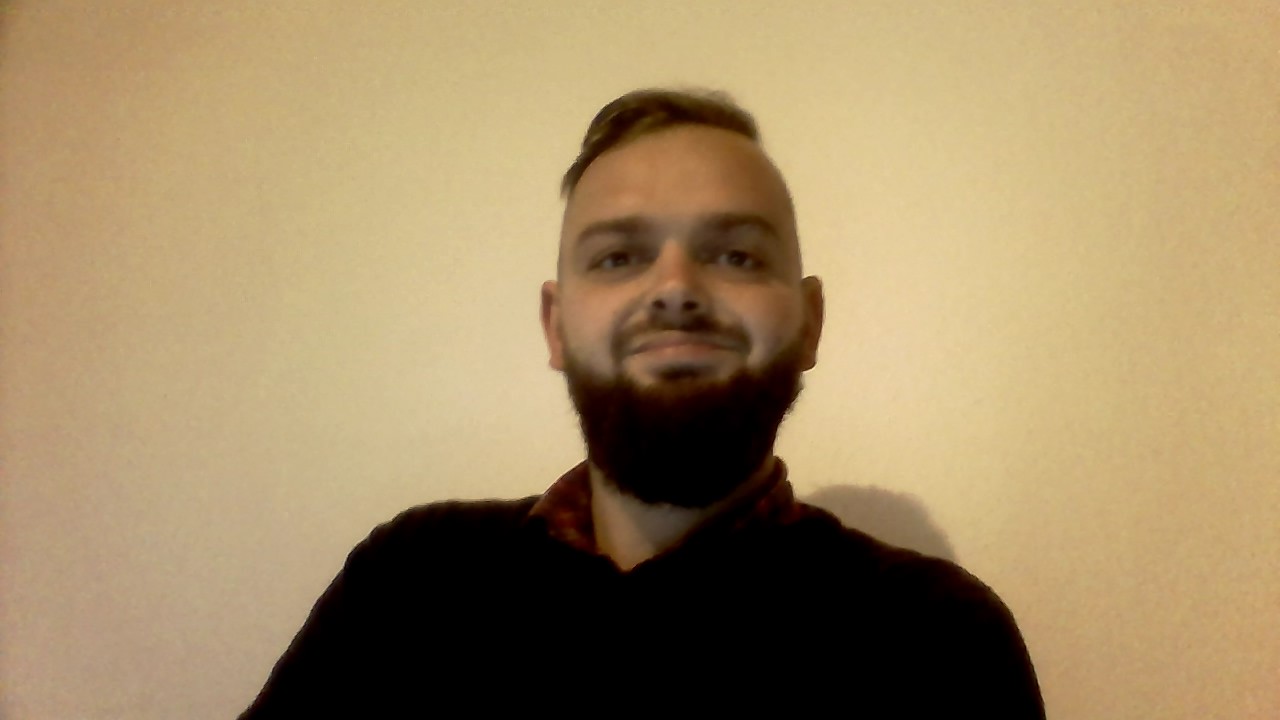 Hello everybody,
Hello everybody,
I am Roman Lukas and i`m from Germany. I live in the city called Siegen. I am in Romania, Izvoarele, since two days and the rural area remindes me of the area where i`m coming from. In Germany, expecially in the area around Siegen, we do also have lots of trees, that`s something thats makes me feel like home at least a little bit.
I studied padagogy and i graduated with a Bachelor in 2012. After that i worked with people with mental diseases then i worked in the ambulant child- and youth welfare.
I quit my job because i wanted to try something new and i decided to go abroad to accept the challenges it might bring up. I think one of my biggest challange will be loosing the fear of dogs haha
I like listening to music and visiting concerts. I also like to watch movies or to read (i prepared myself for the journey by reading Herta Müller, who is a romanian/ german writer). Playing Soccer or Basketball is also one of my favorite activities.
In my time in Romania i want to learn a lot about the romanian culture and the people who are living here. I`m also interested in nature and i want to discover the romanian landscape.
So far, that`s enought about me. I will end with a quote:
” It`s better to burn out than to fade away” (Neil Young)
Bună tuturor,
Eu sunt Roman Lukas și sunt din Germania. Locuiesc în orașul numit Siegen. Sunt Izvoarele, România de două zile iar zona rurală îmi aduce aminte de zona de unde vin. În Germania, mai ales în zona din jurul Soegenului, avem de asemenea o grămadă de copaci, asta fiind ceva ce mă face să mă simt ca acasă măcar puțin.
Am studiat Pedagogie și am absolvit licență în 2012. După asta, am lucrat cu persoane cu boli mintale și apoi am lucrat în asistență socială ambulantă pentru copii și tineri.
Am demisionat de la slujba mea pentru că am vrut să încerc ceva nou și am decis să merg peste hotare să accept provocările pe care l-ar putea aduce. Cred că una dintre cele mai mare provocări pentru mine va fi săsscap de frica de câini haha.
Îmi place să ascult muzică și să merg la concerte. De asemenea îmi place să vizionez filme și să citesc (m-am pregătit de călătorie prin a citi Herta Müller, care este o scriitoare română/germană). Jucatul de fotbal și baschet sunt de asemenea unele dintre activitățile mele favorite.
În timpul meu în România vreau să învăț mult despre cultura română și despre oamenii care locuiesc aici. Sunt de asemenea interedat de natură și vreau să descopăr peisajul românesc.
Până acum, atât este suficient pentru mine. Voi încheia cu un citat:
” It`s better to burn out than to fade away” (Neil Young)
Roman este în România pentru o perioadă de opt luni, din ianuarie 2019 până în septembrie 2019, în cadrul proiectului Building Youth Supportive Communities – Environment [2017-2-RO01-KA105-037748] proiect co-finanțat de Uniunea Europeană prin Programul Erasmus+ și implementat în România de către Curba de Cultură.
Portret de Voluntar – Rita (Portugalia)
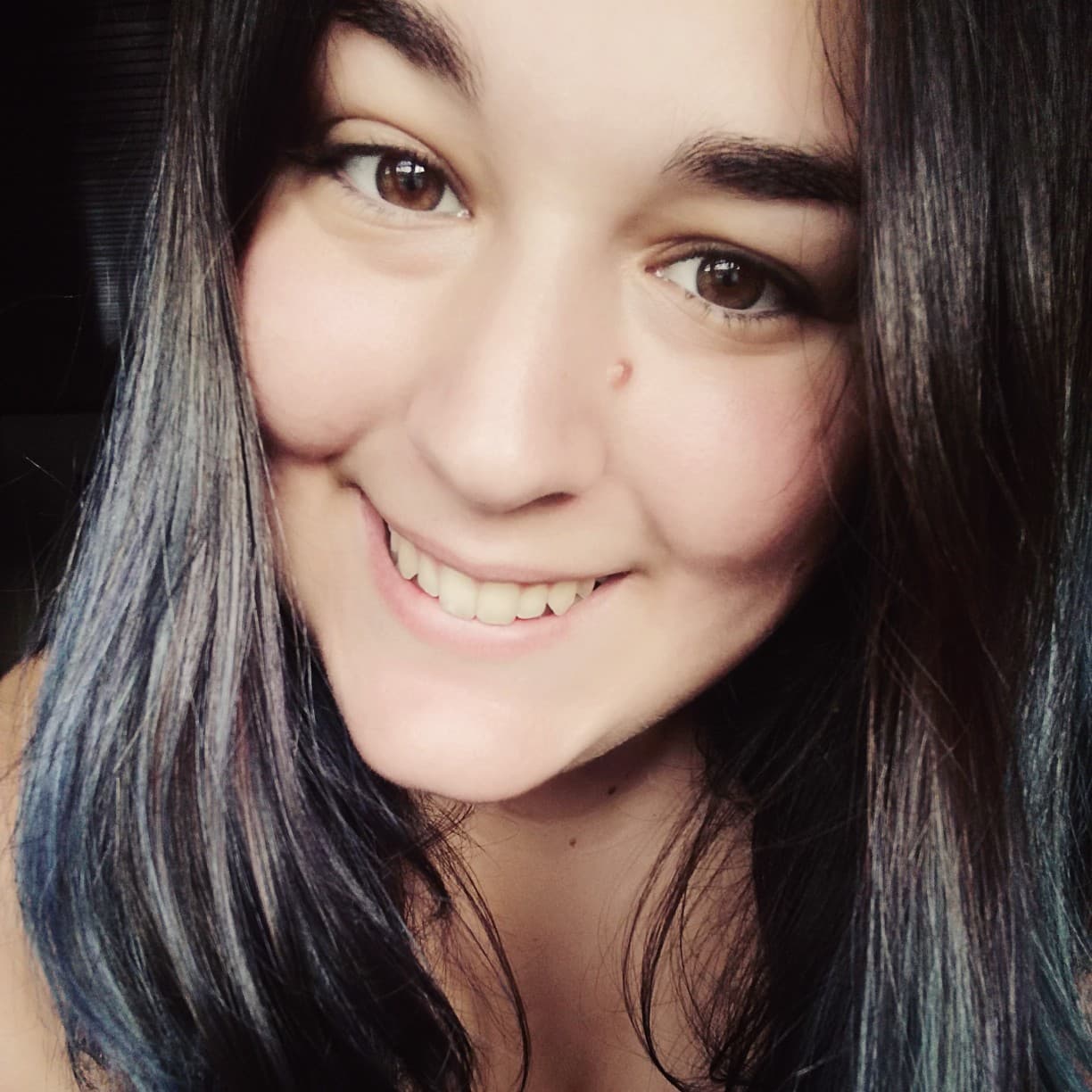 I’ve been asked to write or talk about myself too many times and every time you do it, you are not saying anything that is actually important, because what we say is how we want to be seen, perceived and not that many times what we think about ourselves and ultimately almost never who we are. My honesty always felt bad about this kind of thing, because if I get too honest people will probably have a hard time understanding me, if I am not I am going against what I believe. This is some sort of paradox, product of my own overthinking.
I’ve been asked to write or talk about myself too many times and every time you do it, you are not saying anything that is actually important, because what we say is how we want to be seen, perceived and not that many times what we think about ourselves and ultimately almost never who we are. My honesty always felt bad about this kind of thing, because if I get too honest people will probably have a hard time understanding me, if I am not I am going against what I believe. This is some sort of paradox, product of my own overthinking.
Once, a friend told me, to think about the things I put in my showcase. He thought that my decisions of what to put in it, like being scared of cats and not liking to climb stairs when they don’t seem safe, was not the most appealing information. So I decided to change it. In my showcase, in big letters, you can see now some things like THEATRE and READING. Also you will see TRAVELS and EXTREME CURIOSITY. WRITER.
I am from Portugal, that might be a good thing to keep there, doesn’t have to be in big letters anymore. I should also say I am 24 yo. I have a Degree in Theatre and I like to write, above everything else.
And that is about all I am going to say, for now. But sure will be posting soon, hopefully.
Mi-a fost cerut să scriu sau să vorbesc despre mine de prea multe ori și de fiecare dată când o fac, nu spun ceva ce e cu adevărat important, pentru că ceea ce spunem este cum vrem să fim văzuți, percepuți și nu de așa multe ori ceea ce credem despre noi înșine, și până la urmă aproape niciodată cine suntem. Onestitatea mea mereu s-a simțit rău în legătură cu astfel de lucruri, pentru că dacă sunt prea sinceră probabil oamenii vor avea dificultăți în a mă înțelege, dar dacă nu sunt merg împotriva a ceea ce cred. Acesta este un fel de paradox, produs al propriului meu gândit excesiv
Cândva, un prieten mi-a spus, să mă gândesc la lucrurile pe care le pun în vitrina mea. El credea că deciziile mele în legătură cu ceea ce să pun în ea, ca a fi speriată de pisici și a nu îmi plăcea să urc scări când nu par sigure, nu era cea mai atrăgătoare informație. Așa că am decis să o schimb. În vitrina mea, cu litere mari, poți vedea acum niște lucruri precum TEATRU și CITIT. De asemenea vei vedea CĂLĂTORII ȘI CURIOZITATE EXTREMĂ. SCRIITOR.
Sunt din Portugalia, acesta ar putea fi un lucru bun de ținut acolo, nu trebuie să mai fie în litere mari. Ar mai trebui și să spun că am 24 de ani. Am o diplomă în teatru și îmi place să scriu, mai presus decât orice.
Și asta este cam tot ceea ce am de gând să spun, penteu moment. Dar voi posta din nou curând, sper.
Rita este în România pentru o perioadă de opt luni, din ianuarie 2019 până în septembrie 2019, în cadrul proiectului Building Youth Supportive Communities – Environment [2017-2-RO01-KA105-037748] proiect co-finanțat de Uniunea Europeană prin Programul Erasmus+ și implementat în România de către Curba de Cultură.
First steps with non formal education
When I arrived in Curba de Cultura I knew that because of my project I would have to go to schools to lead classes, propose activities and share knowledge with them in English and French classes; I had been told about non-formal education, we were only then in June and the school holidays had started, so I told myself “we will see later”.
And then, as the summer was over, we were very quickly back to school, and it was time for me to take my first steps in the different schools, not without apprehension! (I had never faced a class in this position before, I have already given tutoring in high schools as well as private language classes but in this way I must admit that I was not reassured…)
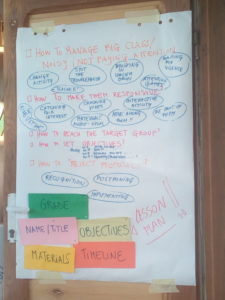
Fortunately we were not dropped in the “cage of wild animals” and we received in Curba de Cultura during 3 days, a very enriching, reassuring and funny training on what non-formal education is, non-formal communication, how to set it up and apply it, we received methods, advice and explanations. We put ourselves in situations and we tried each other in “almost” real conditions, (what a laugh that day, we all fell back into childhood!) We were finally ready to start this new activity as serenely as possible (thanks Kristina and Estelle for this training!!!)
Returning to the main theme of this article, non-formal education (which must be distinguished from informal education) can be defined in this way: it proposes a training and learning time designated as such, without this leading to a final validation in the form of an examination to evaluate what has been learned. This lack of a final evaluation corresponds to the state of mind in which it is carried out. It seeks to foster a spirit of initiative in the participant, who is placed on an equal footing with the learner. Autonomy, initiative, democracy, exchange: these are the key words of non-formal education, which proposes, in an open format, to learn things through mechanisms that allow the active participation of all, this can be for example through games, videos, debates, creative workshops, theatre etc.
So it was with all this new knowledge and especially with a lot of impatience that I was waiting for my first class in order to implement all this. The day D having arrived, my activity was ready and settled at the milimetre, stress and apprehension naturally appeared. Fortunately for me, Estelle was present and accompanied me in this brand new experience. Strangely enough, I immediately felt comfortable in this position, in sharing, in feeling that the students were having a good time and that I was too. I knew right away that I would like it a lot. Of course it took me a few weeks to be totally liberated and each new class was and still is a great experience to correct, improve and learn about how to implement non-formal education.
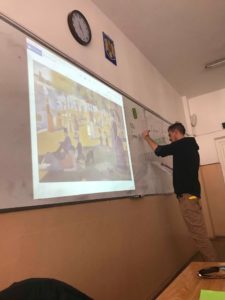 Today, 3 and a half months after my first experience, I had the opportunity to participate in about forty classes with students ranging from the first grade to the twelfth grade (from the first kindergarten class to the last high school class)
Today, 3 and a half months after my first experience, I had the opportunity to participate in about forty classes with students ranging from the first grade to the twelfth grade (from the first kindergarten class to the last high school class)
We played many games together, sang, drew, watched videos, answered quizzes, tested our memory and concentration, jumped and turned on ourselves… but we also learned many things about cultures, languages, differences, cultural shock, diversity… but above all we had a great time! And it seems to me that this is one of the essential things when you want to transmit knowledge, know-how or even interpersonal skills.
I am happy to have been able to explore and practice this form of education during my volunteer work, which has taught me and brought me a lot of knowledge as much as it has on a personal level and I am now sure that I want to continue and deepen my learning in this way.
/ Traducere in Romana in lucru/
Call for a Swedish volunteer
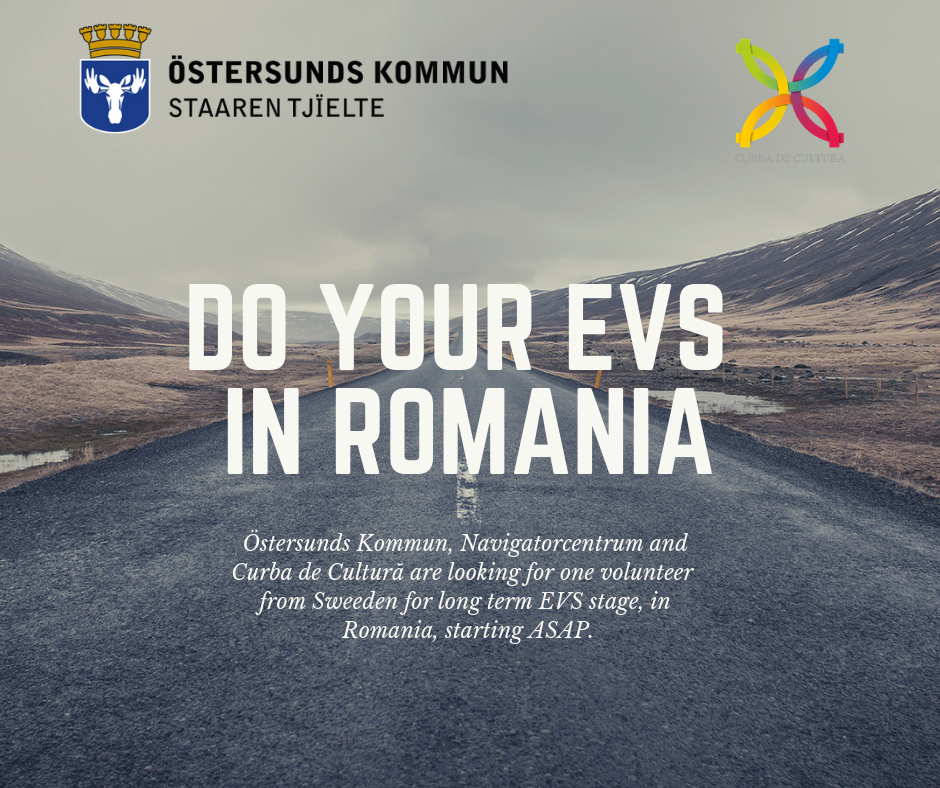
Curba de Cultură is looking for 1 Swedish volunteer for an EVS volunteering stage in Izvoarele, a nice and cozy Romanian village. Together with our partner Navigatorcentrum (Ostersunds Kommun), we are developing and implementing an EVS for Swedish youngsters who would like to do this service in Romania, starting from spring 2019.
The profile of the volunteer we are looking for:
- motivation to live and work in rural area for several months (the total length will be decided together with the organizations)
- motivation to work with youngsters and children
- basic knowledge of English
The activities we propose:
- promoting non-formal learning and volunteering through presentations and activities
- non-formal learning activities with children in schools and with youngsters in the youth centre
- organizing outdoor cinema nights
- managing the library within the youth centre
- organizing foreign language classes and cultural events
- writing articles and blogposts
- creating promotional materials for the area/ community (photos, videos etc) and taking care of the webpage of the commune
- reporting and documenting activities
The support we offer:
- accommodation in a traditional Romanian house
- pocket money and budget for food
- phone sim card and monthly credit for it
- bus permits for local transport
- international travel costs up to 275 EUR reimbursed in the end of the stay
- Romanian language classes through OLS system
- mentor support for personal development
- coordinator support for implementing activities
- medical insurance through Cigna Insurrance Plan
- Youthpass certificate
- two international trainings provided by the Romanian National Agency
- internal training for nonformal education methods and communication techniques (and other training if required/ available)
- smiles and hugs
Other details about the project:
Curba de Cultură focuses on teenagers and youth development. Our mission is to use non-formal education as a complementary method to the formal educational system for young people. We want to create the premises for a better development of the young people and their more suited integration within their respective communities. We want to make young people aware that they actively belong to their local and national culture.
Navigatorcentrum is an organisation for young people aged 16-25 in Östersunds municipality, organised under the Municipality Administration, development/growth area. It is a meeting place where young people can have a coffee, use a computer or have a meeting with a coach. The main tasks is to find, meet and coach young people en route into adult life, with a particular focus on those who need extra support to find their way. To clarify; unemployed youth and a special focus is kept on long-term unemployed youth, youth receiving social service, immigrant/refugee-youth, disadvantaged youth, youth not in the school-system but also youth in general thinking about their future. All young people get a personal coach that give support through programs of introduction to a working life, various motivation-actions and guidance-counselling.
Length of stage: Several months (to be decided together with Navigatorcentrum and Curba de Cultură)
Location: Izvoarele, Prahova County, Romania (the historical region of Walachia)
Sending/Coordinating organization: Navigatorcentrum
Hosting Organization: Curba de Cultură
If we caught your attention send us a CV and motivation letter at sorin@curbadecultura.ro ASAP
Also if you want to know more do not hesitate to ask using the same e-mail.
P.S. Explore this webpage to find out more about the community, the work and the volunteers we host.
Portret de voluntar – Tea (Croația)
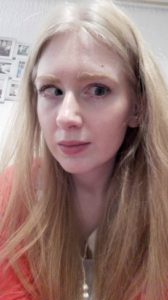
[EN]
Hi! My name is Tea. I am from Croatia where I lived in Slakovci, a small village very similar to the Romanian villages. I am 25 years old and I studied chemistry. Some of the things I like are reading books, spending time in nature, meeting new people and animals, (I am in Romania just three days and I already made friends with two cats and two dogs!!), eating chocolate and drawing. I worked as a babysitter but I never had the opportunity to work with school aged children so I am really looking forward to that experience. I also like learning new languages so I hope by the end of my project I`ll speak at least some Romanian.
[RO]
Bună! Numele meu e Tea. Sunt din Croația, unde am locuit în Slakovci, un sat mic foarte similar cu satele din România. Am 25 de ani și am studiat chimie. O parte din lucrurile care îmi plac sunt cititul cărților, petrecutul timpului în natură, întâlnitul de noi oameni și animale (sunt în România de doar trei zile și deja m-am împrietenit cu două pisici și doi câini!!), mâncatul de ciocolată și desenatul. Am lucrat ca babysitter dar nu am avut niciodată oportunitatea să lucrez cu copii de vârstă școlară, așa că aștept cu nerăbdare această experiență. De asemenea îmi place să învăț noi limbi deci sper că până la sfârșitul proiectului meu voi vorbi măcar niște română.
Tea este în România pentru o perioadă de șase luni, din decembrie 2018 până în mai 2019, în cadrul proiectului Volunteer to Grow [2017-1-HR01-KA105-035177] proiect co-finanțat de Uniunea Europeană prin Programul Erasmus+ și implementat în România de către Curba de Cultură.
Căutăm un voluntar român pentru un stagiu în Suedia
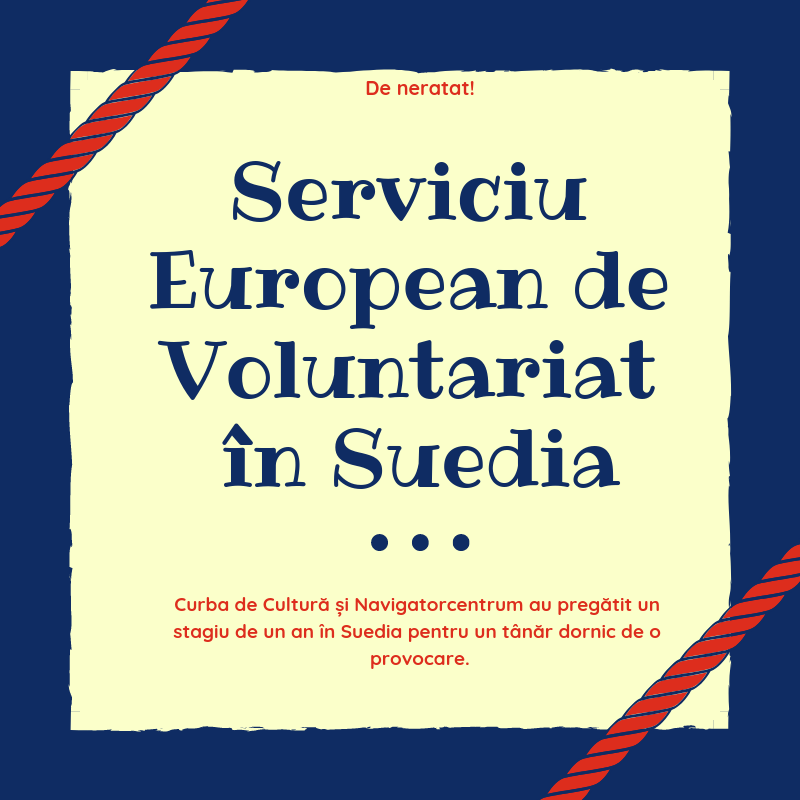
Partenerul nostru Navigatorcentrum, din Östersund Suedia caută un tânăr sau o tânără pentru un proiect de voluntariat internațional ce începe cât mai curând posibil care să ajute la organizarea de activități educaționale în cele două centre de lucru.
Prin urmare, dacă ai:
- între 20 și 30 de ani
- îți place să înveți și ești curios
- ești activ, lucrezi cu entuziasm și responsabilitate
- ești sociabil și te poți organiza și singur când e cazul
- ești creativ și dornic să îți pui ideile în practică
- înțelegi și vorbești engleză acceptabil
- ești dornic/ă să înveți suedeza
ești potrivit pentru proiectul nostru de voluntariat.
Partenerii noștri din Suedia îți vor asigura cazarea într-o casă împreună cu alți voluntari, o alocație pentru masă, bani de buzunar și transport local. Pe lângă asta, primești asigurare medicală și rambursarea transportului până acolo și înapoi, în limita a 275 euro.
Ce altceva mai primești?
- cunoștințe și abilități de planificare, organizare și implementare de activități educative și sociale
- posibilitatea de a-ți transforma ideile în proiecte și de a influența tinerii de acolo într-un mod pozitiv
- experiență de muncă în organizarea de evenimente, managerierea de proiecte, promovare și comunicare
- traiul independent și într-o altă țară
- posibilitatea de a învăța suedeză și de a-ți extinde cercul de prieteni.
Dacă sună cât de cât bine ceea ce primești, uite cât de simplu este să le primești. Sarcinile și responsabilitățile tale vor fi:
- să determini crearea unor legături între tineri, să facilitezi participarea la diferite activități organizate pentru tineri
- să organizezi activități interne: ateliere de gătit, de lucru manual, activități sportive, discuții, activități în aer liber, seri de film și alte activități de timp liber în concordanță cu intereslee tinerilor și creativitatea ta.
- să iei parte la organizarea a două mai evenimente publice cu focus pe incluziune și coeziune
- și multe alte sarcini creative
Mai multe detalii despre activitățile organizației gazdă, aici.
Acum că știi cu se se mănâncă proiectul ăsta, pune mâna și scrie-ne un email cu CV și scrisoare de intenție (ambele în engleză) atașate, cât mai repede la sorin@curbadecultura.ro. Tot acolo trimiți și întrebările și nelămuririle dacă ai vreounele.
Call for German volunteer
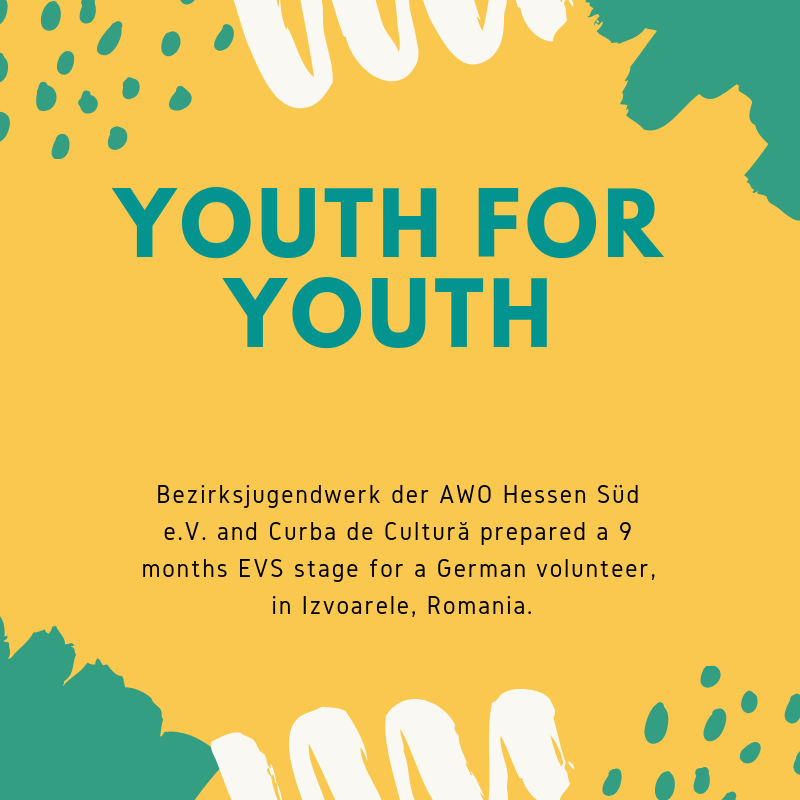
Curba de Cultură together with Bezirksjugendwerk der AWO Hessen Sud are looking for a German volunteer for a nine months EVS in Izvoarele, a nice and cozy Romanian village.
The project aims to improve the level of integration of young people belonging to marginalized groups such as the ones facing economical issues, geographical issues, coming from ethnic, sexual or religious minorities etc.
Tasks include:
– Working with children and youths in creative workshops
– Organize international events together with the community
– Promote volunteering in the extended community of Izvoarele
– Provide a framework for peer learning among the international volunteer and local young people;
– Increase the sense of tolerance, understanding, solidarity and European Citizenship among the volunteers and the young people in the community by taking part in several different activities, talks, etc.
– Creating promotional materials for the area/ community (films, brochures etc)
What we provide?
- accommodation in a traditional Romanian house (but with wi-fi :P)
- pocket money and budget for food
- bus permits for local transport
- phone sim cards and monthly credit for it
- international travel costs up to 275 EUR reimbursed
- medical insurance through Cigna Insurrance Plan
- Romanian language classes through OLS system
- mentor support for personal development
- coordinator support for implementing activities
- Youthpass certificate
- two international trainings provided by the Romanian National Agency
- internal training for nonformal education methods and communication techniques (and other training if required/ available)
- smiles and hugs
We are looking for an 18-30 years old volunteer who has:
– motivation to live and work in rural area for 10 months
– motivation to work with youngsters and children
– motivation to do international volunteering
– basic knowledge of English both in writing and speaking
– interest in learning a different European language
How to apply?
Please send us your CV and motivation letter at sorin@curbadecultura.ro ASAP as well as any other questions you might have.
P.S. Explore this webpage to find out more about the community, the work and the volunteers we host.
Tenerife – Un nou început
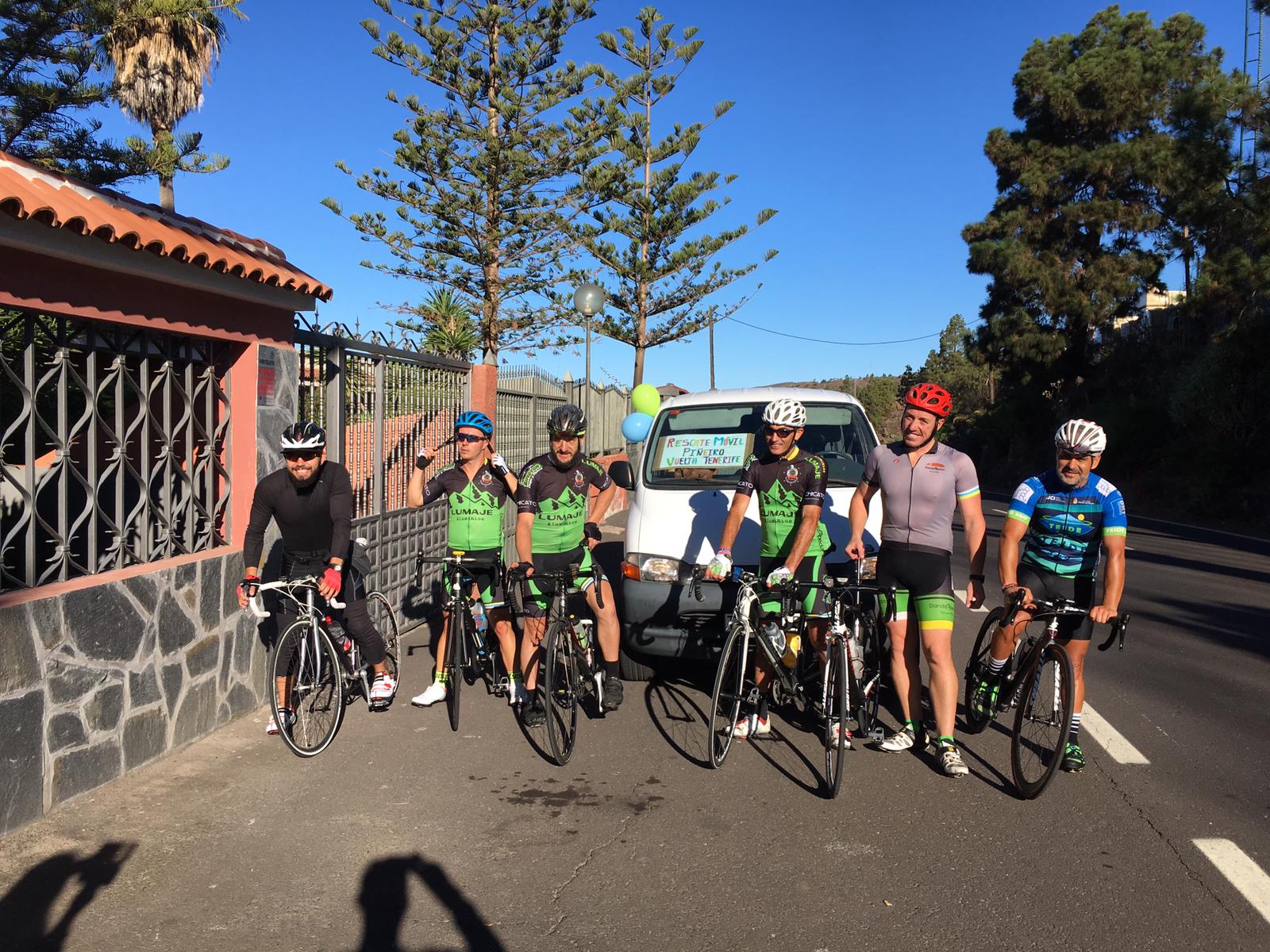 Nu ușor mi-a fost gândul să las totul în urmă, să mă desprind de prieteni și de job, de familie și de locuri, de amintiri și de experiențele cele mai noi trăite.
Nu ușor mi-a fost gândul să las totul în urmă, să mă desprind de prieteni și de job, de familie și de locuri, de amintiri și de experiențele cele mai noi trăite.
Am intrat în “lumea Erasmus” încă de la 17 ani, când am participat datorita bunei mele prietene Adelina, la primul meu youth exchange și am văzut-o ca pe o “lume” ce trebuie explorată – opt ani mai târziu, 31 de proiecte E+, sute de persoane noi și faine, întâlnite, zeci de prietenii legate și nenumărate nopți nedormite, am ajuns, culmea, tot datorită Adelinei, în Tenerife, Spania, pentru proiectul ce urma să-mi schimbe cu totul și cu totul viața.
Acomodarea, nu pot spune că a fost grea dar, de durata. Nu doar bariera lingvistică, deoarece lumea nu vorbește mai deloc engleza, eu începând să vorbesc spaniola la un nivel conversațional dupa abia două luni, dar și comportamentul acestora, catalogându-l ca pe unul straniu din punctul meu de vedere (comozi și nu foarte dornici de implicare în ceva nou), a întarziat procesul meu de “integrare în comunitate”, prin urmare, și desfășurarea activităților propuse.
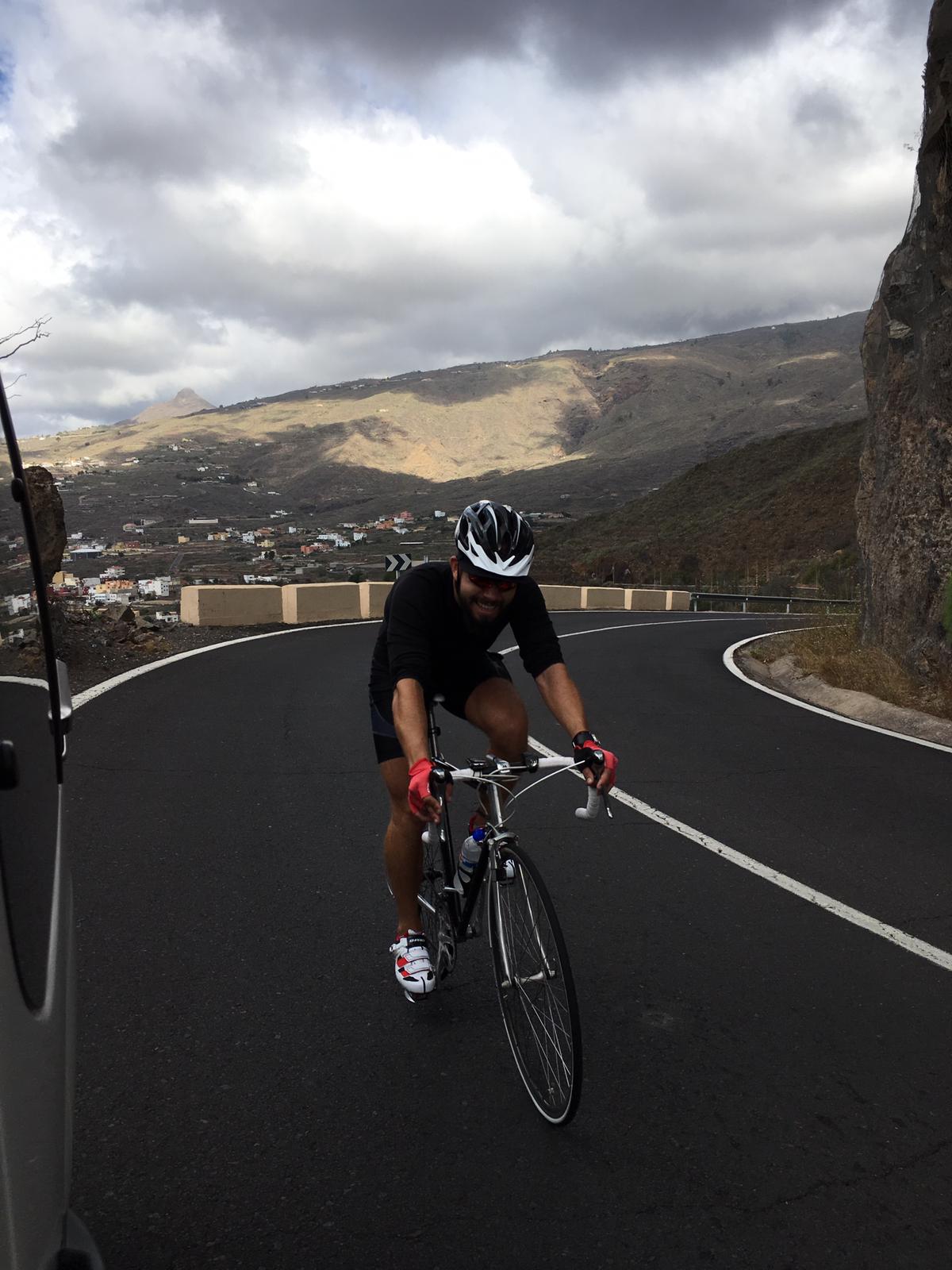 O activitate recentă ce cred că îmi va rămâne întipărită în minte pentru o bună perioadă de timp este “înconjurul insulei pe bicicletă”. Fiind primii mei 167 km pe bicicletă, din care 60 km fără oprire, au reprezentat fără îndoială, una din cele mai mari provocări cu care m-am întâlnit până acum.
O activitate recentă ce cred că îmi va rămâne întipărită în minte pentru o bună perioadă de timp este “înconjurul insulei pe bicicletă”. Fiind primii mei 167 km pe bicicletă, din care 60 km fără oprire, au reprezentat fără îndoială, una din cele mai mari provocări cu care m-am întâlnit până acum.
Din dorința de a inspira tinerii să facă sport, am început cu 5 săptămâni înainte de eveniment (experiența ne-a învățat că o perioadă mai mică de o lună este insuficientă pentru a atinge grupul țintă), să promovăm activitatea atat online cât și offline. Evenimentul a inclus și două ieșiri de pregătire, dintre care la cea de-a doua (însumand un total de 83 km) au participat 15 tineri dornici să ia parte și la evenimentul final. Din păcate pentru noi toți, atât în ziua evenimentului cât și cu o zi înainte, vremea din Tenerife a suferit o schimbare drastică (furtuni și ploi puternice), fapt ce a dus la abandon din partea a 10 tineri din cei înscriși.
Împreună cu cei 5 rămași, două mașini care să ne asiste, multe râsete, provizii și mult curaj, am început, în dimineața zilei de 20 octombrie, la ora 6:30, înconjurul insulei. Drumul a fost anevoios și, cu toate că eram determinați să mergem până la capăt, într-un final, uzi până la oase, ne-am oprit la km 167 din cei 217 km, din cauza ploii.
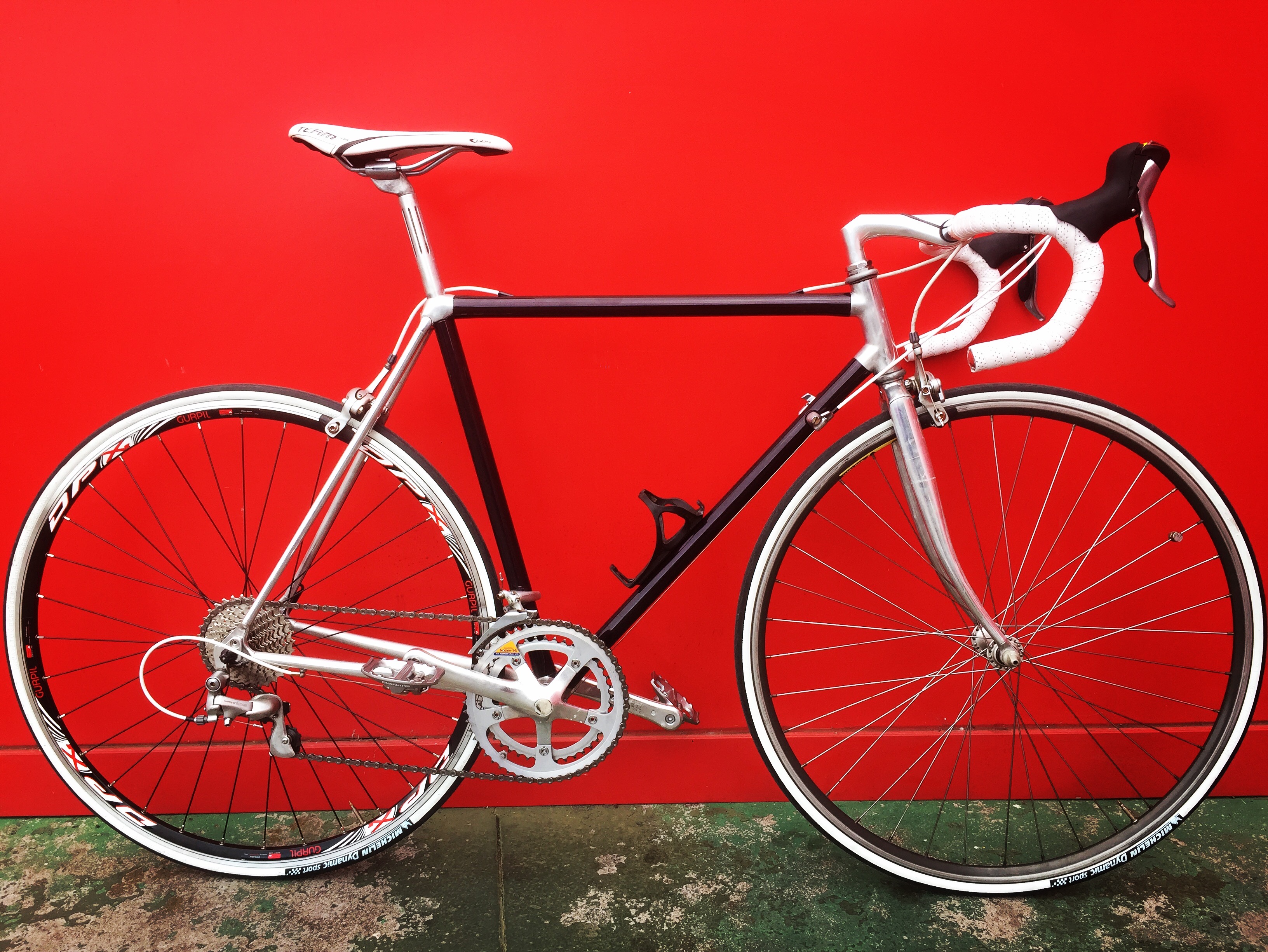 Evenimentul poate fi considerat un succes, indiferent de numărul participanților deoarece pozele postate și poveștile relatate au reușit să anime și mai mulți tineri urmând ca în viitorul apropiat, cel mai probabil finalul lunii noiembrie, să mai organizăm încă un eveniment de acest fel.
Evenimentul poate fi considerat un succes, indiferent de numărul participanților deoarece pozele postate și poveștile relatate au reușit să anime și mai mulți tineri urmând ca în viitorul apropiat, cel mai probabil finalul lunii noiembrie, să mai organizăm încă un eveniment de acest fel.
Șase luni mai am la dispoziție în încercarea mea de a face o schimbare în stilul de viață al tinerilor din Tenerife și am mari speranțe că, odată cu noii prieteni, cunoștiințele acumulate și cu vizibilitatea proiectului, totul va deveni din ce în ce mai ușor.
Vlad se află în Tenerife (Spania) pentru o periodă de 12 luni, din mai 2018 până în aprilie 2019 în cadrul proiectului Island Health [2017-3-ES02-KA105-010522], proiect cofinanțat din programul Erasmus+ și implementat în Spania de către Association P.O.D.
Dacă și ție ți-ar place un stagiu de voluntariat internațional cu toate cheltuielile acoperite, nu ezita să ne scrii la evs@curbadecultura.ro
Cultural shock in Romania / Șoc cultural în România
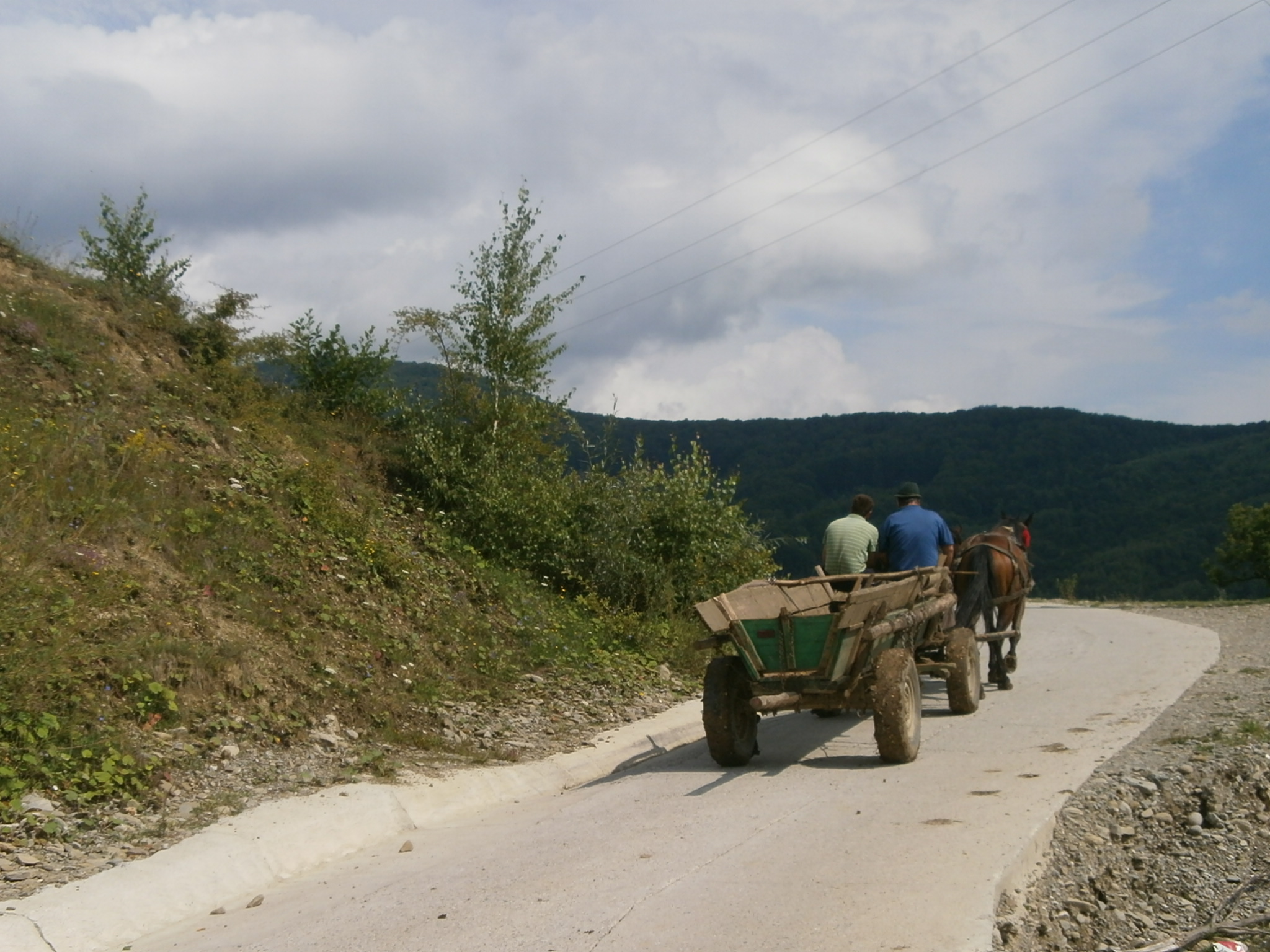
[EN] Three and a half months ago, when I arrived, Romania directly surprised me, keeps surprising me every day and will certainly surprise me the whole duration of my stay here. I am surprised in many ways, whether by the beauty of its landscapes, its people, its customs and habits. It is a country full of surprises and richness that I wish to know more about.
I will speak here of “culture shock”, of things and anecdotes that I was able to see or experience in Romania and that were for me a confrontation with otherness, which were a sign of different reality, than that of my own. Different from my own culture, my own habits.
But before that, I would like to clarify this notion, this idea of culture shock by putting things in context.
Indeed having arrived in Romania only 3 and a half months ago, I would have no pretension to describe “a Romanian culture” in all its aspects. So far I had the chance to know only Izvoarele and its surroundings, Brasov, Bucharest, Sighisoara, Vama Veche and Constanta, so I would not speak only of what I could live or see. I would also like to point out that what I am going to consider as a “culture shock” is strictly personal, the elements will be directly related to who I am: a young French man of 29 years of age who lived in Latin America for several years, to what I have experienced in my life; in other words, these cultural differences could never be the same for another person. And finally there will be no value judgment, no criticism, I would simply be in the shoes of an external observer for whom differences of any kind are a richness to understand others.
My first big surprise when I arrived, while I was still in the car being driven in the rain (having left Paris a few hours earlier under a blazing sun of about 30 degrees…) was to observe the rolling landscapes, curves and mountains, coming from a region bordering Belgium called “the flat country” this difference of landscapes jumped directly to my eyes.
In the days after my arrival there was a line of surprises about my village, between the herds of cows coming down the street every night singing their bells, the countless street dogs quietly making their lives (I have never seen a street dog in France), the fruit/vegetable sellers shouting in the street, the wooden horsecarts used daily or the zigzag moves that you have to do while driving in order to avoid holes in the road: the change of scenery was very complete for me!
In the following days I was very surprised to observe that many people hitchhiked along the roads to get around, or that cars stopped when we were waiting for the bus to offer to take us. That was the point where I decided to try the adventure myself with my first three Romanian phrases, “buna ziua, sunt voluntar, nu am bani”, and my astonishment was even greater when I realized that it was really working very well (not without some nice laughs from the drivers). From here on, I used this method to move around without hesitating (Bucharest, Vama Veche, Brasov, Sighisoara), fortunately I have always come across people who speak a little English, French or Spanish which allowed me to communicate during the trip… And it was still a surprise that in most of these conversations (saw no generality in my subject! it’s just my experience), most people came to talk without any restraint and with hatred about their racism towards the gypsy community. Me being used to people feeling ashamed to have such ideas, that they usually only express them through the ballot box, the freedom of speech that my drivers have reported is confusing to me.
I was also amazed to observe that in the cities, people respect traffic lights, patiently wait for the light to go green in order to cross. Being used to people crossing as soon as the opportunity arose in France or even in Latin America where there sometimes even is no signs, it was a sure fun to observe this.
Then gradually as I grasped another characteristic of Romanian society, which is the place of religion in people’s lives. Religion seems to me to be omnipresent, whether it is through the various religious objects that can be observed in the streets, in front of houses or through the signs of the cross that people make when they meet a church, whether they are elderly or younger, this represents a great cultural difference for me.
More recently I learned when I went with my roommate to the village bar at the end of the day on a referundum day, where the police stationed there, that it was not possible to buy and drink alcohol on election days, people explained to us that this was a law to encourage people to go to the polling station, it seemed very surprising to me and was probably my most recent”culture shock”.
I think I have shared with you the most striking situations and anecdotes for me during these first 3 months in this country, there are obviously others, but probably less significant for me.
I hope now to complete this list while I am here for the next 5 months, to continue discovering and getting to know this very special and endearing country, to confront myself more and more with what cultural differences have to offer us and to learn on a daily basis.
[RO]
Acum trei luni și jumătate când am sosit, Romania m-a surprins efectiv, continuă să mă surprindă în fiecare zi și va continua cu siguranță să mă surprindă pe toată durata șederii mele aici. Sunt surprins în multe feluri, de către frumusețea priveliștilor ei, de către oamenii ei, practicile și obiceiurile ei. Este o țară plină de surprize și bogății despre care îmi doresc să aflu mai multe.
Voi vorbi aici despre “șoc cultural”, despre lucruri și anecdote pe care am putut să le văd sau să le experimentez în România și care au fost pentru mine o confruntare cu altfelul, ceea ce a fost un semn al unei realități diferite decât cea a mea. Diferit de cultura mea, de obiceiurile mele.
Dar înainte de asta, aș vrea să clarific această noțiune, această idee de șoc cultural prin a pune lucrurile în context.
Într-adevăr având în vedere că am ajuns în România cu doar trei luni și jumătate în urmă, nu aș avea nicio pretenție să descriu “O Cultură a României” în toate aspectele ei. Până acum am avut șansa să cunosc doar Izvoarele și împrejurimile sale, Brașov, București, Sighișoara, Vama Veche și Constanța, deci aș vorbi doar de ceea ce aș fi putut să trăiesc sau văd. Aș vrea de asemenea să punctez că ceea ce eu am să consider ca fiind un “șoc cultural” e strict personal, elementele vor fi în directă relație cu cine sunt: un tânăr bărbat francez în vârstă de 29 de ani ce a trăit în America Latină pentru câțiva ani, raportat la ceea ce am experimentat în viața mea; în alte cuvinte, aceste diferențe culturale nu ar putea fi niciodată la fel pentru o altă persoană. Și nu în ultimul rând nu va fi nicio judecată de valoare, nicio critică, voi fi pur și simplu în pantofii unui observator exterior pentru care diferențele de orice fel sunt o îmbogățire care ajută să îi înțelegi.
Prima mea mare surpriză când am sosit, cât încă eram în mașină, condus prin ploaie (după ce am părăsit Paris-ul cu câteva ore în urmă sub un soare arzător de cam 30 de grade…) a fost să observ peisajele ce se derulau prin fața mea, curbele și munții; venind dintr-o regiune aflată la granița cu Belgia numită “țara plată”, această diferență de peisaje mi-a sărit în ochi imediat. În zilele de după venirea mea am avut o linie de surprize când vine vorba de satul meu; între cirezile de vaci ce vin în josul străzi în fiecare noapte cântându-și clopotele, nenumărați câini vagabonzi trăind-și viețile în liniște (Nu am văzut niciodată un câine vagabond în Franța), vânzătorii de fructe/legume strigând pe stradă, căruțele din lemn trase de cai și folosite zilnic sau mișcările în zigzag pe care trebuie să le faci când conduci pentru a evita găurile din drum: schimbarea de decor a fost foarte completă pentru mine!
În zilele ce au urmat am fost foarte surprins să observ că mulți oameni făceau autostopul de-a lungul drumurilor pentru a se deplasa, sau că mașini opreau când noi așteptăm microbuzul pentru a se oferi să ne ia. Acela a fost punctul unde am de ieșit să încerc aventura și eu cu primele mele trei fraze în română, “Bună ziua, sunt voluntar, nu am bani”, și mirarea mea a fost chiar și mai mare când am realizat că merge chiar foarte bine (nu fără niște râsete bune de la șoferi). De aici înainte, am folosit metoda asta pentru a mă deplasa prin jur fără ezitare (București, Vama Veche, Brașov, Sighișoara). Din fericire întotdeauna am dat peste oameni care vorbesc puțină engleză, franceză sau spaniolă, ceea ce mi-a dat voie să comunic de-a lungul călătoriei… Și a fost încă o surpriză că în mare parte din aceste conversații (a nu se vedea generalizare în subiectul meu! este doar experiența mea), majoritatea oamenilor au ajuns să vorbească fără nicio reținere și cu ură despre rasismul lor față de comunitatea țiganilor. Eu fiind obișnuit ca oamenilor să le fie rușine să ai e astfel de idei, așa încât de obicei le exprimă doar prin urna de votare, libertatea de exprimare pe care șoferii mei au raportat-o îmi induce confuzie.
Am fost de asemenea uimit să observ că în orașe, oamenii respectă semafoarele, așteaptă cu răbdare ca lumina să se facă verde pentru a trece. Fiind obișnuit cu oameni care trec de îndată ce oportunitatea apare în Franța sau chiar în America Latină unde uneori nici măcar nu sunt semne de circulație, a fost cu siguranță distractiv să observ asta.
Apoi gradual peste mai mult timp am mai înțeles încă o caracteristică a societății românești, care este locul religiei în viețile oamenilor. Religia îmi pare a fi omniprezentă, fie că prin variile obiecte religioase care pot fi observate pe străzi, în fațele caselor sau prin semnul crucii pe care oamenii îl fac când întâlnesc o biserică, indiferent dacă sunt în vârstă sau mai tineri, aceasta reprezintă o mare diferență culturală pentru mine.
Mai recent am învățat când am mers cu colegul meu de cameră la barul din sat la sfârșitul zilei într-o zi de referendum, unde poliția staționase, că nu era posibil să cumperi și să bei alcool în zilele de alegeri, oamenii ne-au explicat că asta esteo lege care să încurajeze oamenii să meargă la secțiile de votare; a părut foarte surprinzător pentru mine și a fost probabil cel mai recent “șoc cultural” al meu.
Cred că am împărtășit cu voi cele mai izbitoare situații și anecdote ale mele din perioada acestor prime 3 luni în această țară, mai sunt desigur și altele, dar probabil mai puțin semnificative pentru mine.
Sper acum să completez această listă în timpul în care sunt aici pentru următoarele cinci luni, să continui descoperirea și cunoașterea acestei foarte speciale țări ce te face să o îndrăgești, să mă confrunt pe mine mai mult și mai mult cu ce au diferențele culturale să ne ofere și să învăț zi de zi.
Baptiste este în România pentru o perioadă de opt luni, din iulie 2018 până în februarie 2019, în cadrul proiectului Voluntary Generation [2017-2-FR02-KA105-013326] proiect co-finanțat de Uniunea Europeană prin Programul Erasmus+ și implementat în România de către Curba de Cultură.